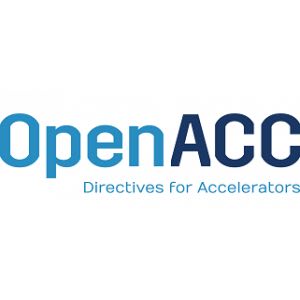 Today the OpenACC standards group announced plans to showcase new advancements and increasing momentum for their programming model at ISC 2017 in Frankfurt.
Today the OpenACC standards group announced plans to showcase new advancements and increasing momentum for their programming model at ISC 2017 in Frankfurt.
OpenACC is a user-driven directive-based performance-portable parallel programming model designed for scientists and engineers interested in porting their codes to a wide-variety of heterogeneous HPC hardware platforms and architectures with significantly less programming effort than required with a low-level or explicit models.
Activities at ISC17
Developers are encouraged to engage with the OpenACC community at four events during ISC17. Network with other OpenACC developers over beer at the OpenACC
User Group meeting, attend research presentations at the third P^3MA Programming Model for Accelerators Workshop, attend the session on Performance Portabililty with OpenACC and PGI Compilers and gain perspective on “Performance Portability and MPI+X: The state of X.” Check the schedule here to get in on the action.
Top HPC Applications Adopting OpenACC
OpenACC adoption by HPC applications has shown sustained growth. OpenACC now accelerates ANSYS Fluent (CFD) and Gaussian (Quantum Chemistry) and VASP(Material Science), which are amongst the top 10 HPC applications, as well as selected ORNL CAAR codes to be run on the future CORAL Supercomputer: GTC(Physics), XGC(Physics), LSDalton(Quantum Chemistry), ACME(CWO), and FLASH(Astrophysics).
Early indications are that we can nearly match the performance of CUDA using OpenACC on GPUs. This will enable our domain scientists to work on a uniform GPU accelerated Fortran source code base,” said Dr. Martijn Marsman, Computational Materials Physics at the University of Vienna.
“We’ve effectively used OpenACC for heterogeneous computing in ANSYS Fluent with impressive performance. We’re now applying this work to more of our models and new platforms,” said Sunil Sathe, Lead Software Developer, ANSYS.
The recently upgraded CSCS Piz Daint supercomputer will be running five codes implemented with OpenACC in the near term: COSMO(CWO), ELEPHANT(Astrophysics), RAMSES (Astrophysics), ICON (CWO), ORB5(Plasma Physics).
OpenACC Organization Has Added Three More Members
Virginia Tech, HZDR, and Shanghai Jiao Tong University are the three most recent institutions to join the OpenACC membership. The continued addition of academic, vendor and national lab organizations validates the desire for simplified and portable parallel programming. The new members will shape the OpenACC specification to support their research, contribute to technical and marketing committees, and will help grow a community of OpenACC users who aim to perform more science and research and less programming effort.
New OpenACC Officers
The OpenACC Board has appointed two new officers to the organization.
 Guido Juckeland is the new Secretary for OpenACC. Guido Juckeland founded the Computational Science Group at Helmholtz-Zentrum Dresden-Rossendorf (HZDR), Germany. His research focuses on better usability and programmability for hardware accelerators and application performance monitoring as well as optimization. He is the vice-chair of the SPEC High Performance Group (HPG) and also an active member of the OpenACC technical committee and also contributes to the OpenMP tools working group. Juckeland earned his Ph.D. in Computer Science from Technische Universität Dresden, Germany, for his work on trace-based performance analysis for hardware accelerators.
Guido Juckeland is the new Secretary for OpenACC. Guido Juckeland founded the Computational Science Group at Helmholtz-Zentrum Dresden-Rossendorf (HZDR), Germany. His research focuses on better usability and programmability for hardware accelerators and application performance monitoring as well as optimization. He is the vice-chair of the SPEC High Performance Group (HPG) and also an active member of the OpenACC technical committee and also contributes to the OpenMP tools working group. Juckeland earned his Ph.D. in Computer Science from Technische Universität Dresden, Germany, for his work on trace-based performance analysis for hardware accelerators. Sunita Chandrasekaran is the Director of User Adoption. Her mission is to grow the OpenACC organization and user community. She is currently an Asst. Professor at the University of Delaware. Her research interest spans HPC, parallel algorithms, programming models, compiler and runtime methodologies and reconfigurable computing. She is an active member of SPEC HPG, OpenACC and OpenMP organizations. She was one of the recipients of the 2016 IEEE TCHPC Award for Excellence for Early Career Researchers in HPC. She earned her Ph.D. in Computer Engineering from Nanyang Technological University, (NTU), Singapore for her work on creating high-level software for FPGAs.
Sunita Chandrasekaran is the Director of User Adoption. Her mission is to grow the OpenACC organization and user community. She is currently an Asst. Professor at the University of Delaware. Her research interest spans HPC, parallel algorithms, programming models, compiler and runtime methodologies and reconfigurable computing. She is an active member of SPEC HPG, OpenACC and OpenMP organizations. She was one of the recipients of the 2016 IEEE TCHPC Award for Excellence for Early Career Researchers in HPC. She earned her Ph.D. in Computer Engineering from Nanyang Technological University, (NTU), Singapore for her work on creating high-level software for FPGAs.
“The adoption of OpenACC for mathematical sciences, chemistry, physics, cosmology and cancer research domains highlight that more non-CS scientists are using OpenACC,” said Sunita Chandrasekaran. “I am excited to tackle this new role of user adoption because I firmly believe that users matter. Their involvement is key to creating newer language features, testing existing features, building relevant prototypes and most importantly sharing feedback that helps improve the specification as it continues to grow to better serve the community.”
User Community Is Shaping OpenACC, Feedback Desired
There have been 86% more downloads of the PGI Community Edition with OpenACC in the last 6 months, the third User Group Meeting has been scheduled to discuss the specification, events, research and new ideas at ISC, and the community has come together with the organization to offer five hackathons and numerous workshops a year to help jump start applications support of OpenACC. With more developers using OpenACC for their applications, feedback is essential to identifying areas to build upon.
At ISC17, OpenACC.org is announcing a prototype implementation of the deep copy feature for inclusion in the future specification. Deep copy is the most requested feature by developers and will simplify programming for applications with complex data types. Currently, interested parties are encouraged to give input on the next version. Features, applications and user experiences are welcome. Please email beta@pgroup.com to request access.
Hackathons Abound
OpenACC successes at recent hackathons continue to grow with more attendance and additional venues keep being added. Recently, 20 teams participated in Juelich and Brookhaven hackathons working on 20 different codes. Since its inception in 2014, hackathons have accelerated close to 60 applications across a variety of domains including astrophysics, quantum chemistry, molecular dynamics, bio and particle physics, computational fluid dynamics, climate/weather/ocean modeling and more.
With the high demand for the hackathons, mini-hackathons have been introduced around the world to assist developers with OpenACC in their applications.



